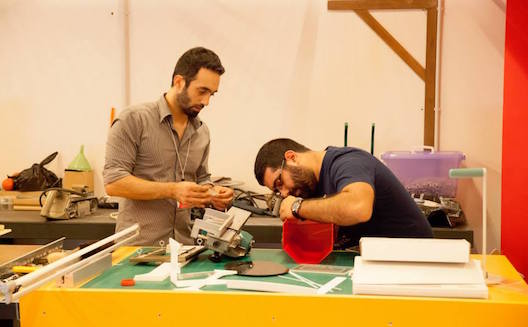Changing MENA with the 'sharing economy'


HBR Creative Platform puts collaboration at the center. (Imave via
HBR Creative Platform)
This article is an edited crosspost from SwitchMed’s blog.
Every generation has a group of crazy people set to 'make a difference and have a positive impact'. These creative entrepreneurs, young innovators, change-makers (they have many names), have all in common a different vision for our economies and businesses: more sustainable, more social, more inclusive and, especially, more collaborative.
The collaborative economy in MENA is not what you see in Europe
Exploring the collaborative economy these three past years, and the different ways and pace it has taken throughout the world has been fascinating.
In France, Spain, and the US, we’re already 'after the Gold Rush' and the discussions have moved away from collaborative consumption to governance structure and value repartition. In MENA we’re still waiting for the gold rush, but a promising shift is happening.
In territories facing multiple changes like the Arab world, collaborative economy, open source and zero-waste initiatives appear fundamental in providing innovative answers to social and economic development needs.
The sharing economy has emerged in a slightly different form in MENA countries compared to Europe. The practices and principles of sharing and collaborating are part of the local culture there. Sharing of household and consumer goods or rides and cars are a very common way of life.
In rural areas or within families, where the sense of tribe is dominant, sharing is still deeply present. But with economic development and fast city growth, the individualistic way of living driven by the value of money has gained strength, while urban dwellers tend to share less.
Digital social innovation and collaborative economy in MENA
In these countries, creative entrepreneurs are innovating to build what is missing: political stability, sustainability and zero waste awareness, women empowerment, and more, by creating flourishing businesses that are addressing their local challenges and reshaping the economy.
Noticing the impact of the collaborative projects in particular, that are using both their local traditional heritage and innovation with the aim of creating social and environmental impact, led me to partner with the UNEP Centre for Sustainable Consumption and Production (SCP/RAC) managing the Green Entrepreneurship and Civil Society Programme within the SwitchMed Initiative.
In our scan of the region, we noticed that most of these projects have a major impact on three sectors in the region: urban space design, mobility, tourism and crafts.
The first two sectors are topics already common to all urban areas internationally. Their development in MENA countries is the result of a global trend affecting most cities and metropoles in the world. But tourism and crafts are areas of particular interest in terms of business model diversity and originality, and they represent a real market differentiation for MENA countries.
We therefore selected twelve diverse projects transforming these three sectors to analyze their business models and identify how we can support, replicate and scale them in the Mediterranean region.
Analysis of the projects business models through the sharing
economy framework
Urban space design
Urban space design is a key issue for growing cities in the MENA region. The coworking and alternative spaces are reinventing the way we consider and develop space in our cities. By allowing collaboration between populations usually left aside, they foster new dynamics in neighborhoods that are deeply missing it.
Projects: HBR Creative Platform in Lebanon; Debbo52 and Tilil Tanit in Tunisia; Orange Bleue Maghreb in Morocco
Mobility
Mobility and traffic are becoming increasingly endemic problems in MENA. Global fuel price rises, an ever-increasing number of cars on streets in big cities, coupled with often unsustainable, inaccessible and unsafe public transportation (bus or collective taxis) pushed many people to either spend significant amounts of money on private cars or to commute in taxis.
It is not a surprise to see emerging carpooling and carsharing platforms in big cities like Cairo, Tunis, or Casablanca, trying to offer innovative solutions for the daily commuters.
Projects: Sheaply and Carmine in Morocco; Karhebtna in Tunisia and Kartag in Egypt.
Tourism and crafts
Tourism and Crafts are the most dynamic and creative sectors currently. Sustainable and collaborative tourism and crafts are an area of particular social innovation, strongly attached to roots and traditions of the region.
Projects: Anou and Craft Draft in Morocco, Waste in Lebanon and El Mensej in Tunisia.
All these young entrepreneurs are building a path towards greater economic and social development, by being creative and full of innovative approaches.



